News
View the latest inspiring and positive news and information about what's going on in the PM and IT world.

In a fast-paced, ever-changing digital world, all organizations have to deal with a high volume of change. But are they well-prepared for this? Is it possible to learn how to be better at managing change in an agile world?
We are delighted to share our interview with Melanie Franklin, Co-Chair of the Change Management Institute UK, Director of Agile Change Management LTD and a respected author of textbooks and articles on change, project, and program management. Melanie has dedicated the last 20 years to build the capability for change in organizations. She is a highly respected thought leader in change management with an impressive track record in the successful realization of business change programs across public and private sector organizations. In 2014 she wrote the book “Agile Change Management”, setting out an approach for managing transformational change initiatives mainly using the ideas from the agile methodologies.
Can you tell me more about your career? How did you come to the change management path?
I started as a Business Analyst, so my job was to look at how processes could run better. This was in global banking. I loved my job and I was promoted to project manager. I ran bigger and bigger projects until I became a Program Manager. As a program manager, I ran large scale transformational change programs, with more than 52 countries involved, so I did a lot of global change, but this was before we called it 'change management'. When we wrote the managing successful program book (Melanie authored Think MSP - a practical guide to how to run programs), we talked about how important it was to implement the changes we were creating. But we didn’t say how to manage the change: we said change management was very important but we didn’t say how to do it. When APMG brought out the Change Management qualification in 2008 I really loved it so, I started using it with my consulting clients and I’ve used it, I’ve helped with ideas for the current version and I’ve been heavily involved writing on both agile and change because that’s what I do with my clients. They want to work in an agile way and they want to run very large scale change initiatives so, using traditional methods like PRINCE2® does not work, it’s too controlled and it implies you know everything at the beginning (which you don’t in change, you never do). Actually, it seemed obvious to me that bringing agile and change together was a good idea; I’m really pleased that I wrote the book Agile Change Management five years ago and I’m really pleased we’re taking into a qualification because it’s exactly what organizations keep asking me for: “How can we manage our change? We’ve got our IT department working in an Agile way and we need to roll the change out in small pieces. We need to do iterations, we need to build up versions.”
Finally, what we came out with it’s a very practical point of view. I had a very successful career as a program director but then I moved to training and consulting in program management and change management which I loved. And now my career is more focused on developing best practice, how we can do better.
So, you started the change management path and then the agility came later?
Yes, I think agility came to a couple of years after we started talking about change because, of course, as you start to do more change initiatives then you realize that change is always going to be “do a little bit, see what the reaction is, do a little bit more”. It naturally is an agile approach and I think that’s where I started to become very interested in agile methods. I went on every course you can imagine, I have every agile qualification. Because that’s how I learn, I always learn a practice first and then I can work on how to implement it. In the last few years, my enthusiasm has to lead me to chair the Change Management Institute in the UK as well. So, I’m very interested in building up recognition for the profession of Change Manager, to make sure that what we do as change management is recognized and appreciated.
How did you come up with the idea of Agile Change Management?
As I mentioned before, my clients wanted to work in an agile way and they wanted to run very large scale change initiatives. Using traditional methods couldn’t work because in an agile environment you don’t know everything at the start, so it seemed obvious to me that bring agile and change together was a good idea. What I wanted to do was to create something that did not assume that somebody being trained was going to be the expert who let the change, because I think that the effective Change Managers Handbook and the Change Management course do that brilliantly. I also did not want to assume that the person needing to be trained was the person involved in the actual project that creates the tangible change (the AgilePM course does that); what I wanted was for somebody to have an understanding of how they might make change happens in the finance function, the marketing department, the operations unit, the call centre, whatever, that they are not experts on either agile or change but what they are is very good at managing their part of the business. But you have to give them a structure and an approach for managing change. This is what this new course does.
What’s the biggest challenge that you see in the agile and change management communities at the moment?
I think the biggest challenge is that with an agile approach you increase the number of changes that go live in an agile organization. Because change happens in every increment, it might be every sprint, and you’re ready to go live with something new. The problem we have is that the brain does not process this requirement to unlearn the old ways of working and learn new ways of working as quickly as we can produce the actual tangible change.
So, implementation and adoption are slower than creation and we end up with people feeling under tremendous pressure because they are struggling to deal with one change when another one comes in, and another one… and I think change and a high volume of change means we need to get better at managing change, we need to keep educating people that it is a skill they can learn. Because if we don’t I’m not sure that organization won’t get to breaking point.
Speaking on the behalf of professional change management, I think we still have to win the argument that change management is the secret to realizing benefits. If you have a project that creates something, it won’t realize benefits if it’s just getting things done - it becomes only a new way of working after a period of time when you see cost reduction, revenue increase, greater customer satisfaction, greater staff engagement. Unless we get the message that to actually run the change in a structured way, we need to use techniques to encourage people to participate and to encourage people and support people in working in new ways, we won’t get benefits. This process is not automatic yet.
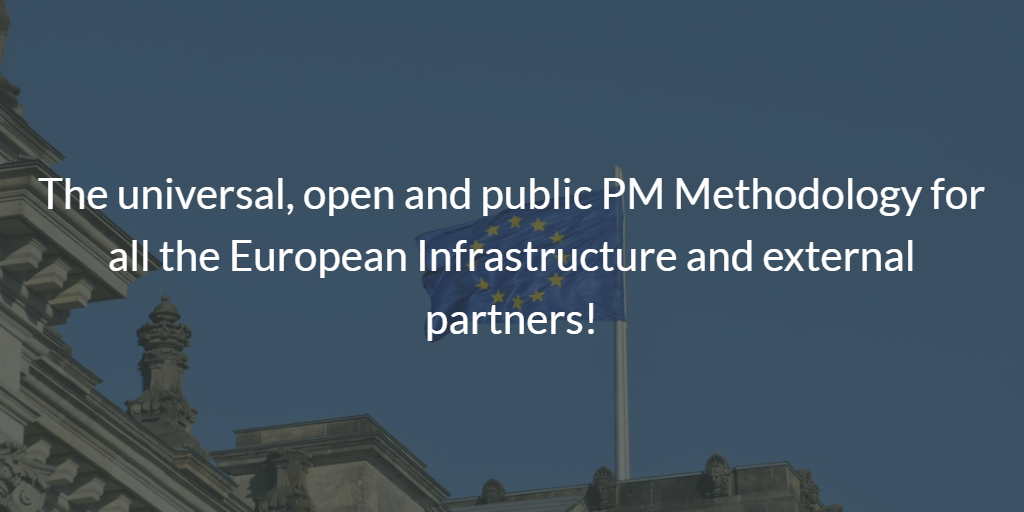
PM² history
Before PM² were several frameworks for organizing the activities around software development for example, but these were not really integrating all the interactions with the stakeholders, they were not allowing for correct tracking of the budget or monitoring performance, or quality for example. They did not propose anything to manage risks or issues. At the other end of the scale were highly generic project management methods coming from outside, like Prince2 or PMBOK but they needed a lot of customization to be able to work correctly in a rather low maturity project environment. The Methodology team in DIGIT started looking at best practices and stitching them together in a coherent way to propose project managers a fluid, simple and robust set of guidelines to organize software development in a controlled way. Carefully selected projects were used to pilot the solution and it was an immediate success. Light and elegant, the new method required little learning time and was immediately efficient with the typical challenges of the public environment: dilution of ownership, strong hierarchies, low maturity in project management, lack of accountability. PM² was born. Instead of immediately promoting PM² as “the” method to use for every project, the team continued selecting pilot projects and volunteers to try and hone the new tool. The success of projects led using PM² started to be known outside of DIGIT and there was a request to adapt the methodology for non-IT projects. This “custom PM²” would eventually replace completely the methodology and speed up its adoption within the numerous departments of the European Commission. By the end of 2010, the importance of having common ways of working, relying on good practices became clear and obvious. The decision was taken to develop not only training courses for PM² but also a certification path to “promote the people that were making the effort to adopt the methodology” and to recognize their commitment in improving the maturity of the European Commission in project management. The first courses started in 2012 and became a rapid success, with nearly a training organized every day and courses full three or four months in advance.PM² made public
Six years later 10,000 professionals were trained and over 1,000 were certified. Back in 2012, the year saw the creation of an official guide, labelled “v2.0” that was totally generic, usable for any type of projects in any context. A year later, the success of PM² started to get known outside, in other European Institutions, thanks to cross institutions projects and staff mobility. In 2014 was published the PM² guide v2.5 which marks a turning point toward “more Europe, less Commission”. It was the basis of the adoption of PM² by the Council of the European Union and by the Parliament. Executive agencies spread within the Member States started to express their interest as well and a real, pan European network was created to link all project management professionals within the European Institutions. In parallel, as the utilization of PM² grew, expectations were on the rise as well, and that started to represent some human challenge to the (relatively) small Methods team within DIGIT: creation of online content, translation in all languages, adaptation for particular types of projects, integration with portfolio or programme management methodologies… On top of that, as most internal projects were run with PM², the institutions were running issues with external partners that did not know the method. It created some frustrations as we had to re-train external project managers which led to a rise in project costs. These issues met also the need for the team to give back to the public what they have used to build such a successful tool, and the decision was taken in 2016 to make PM² public, under an Open Source model that allows everyone to re-use, adapt, complete and modify the methodology free of any charges. In November 2016, the adventure of OpenPM² began: For three months in a row, the OpenPM² book became the second most downloaded material from the EU Bookshop, just behind… the map of the European Union! Do you want to know more on PM²? Watch now Laurent Kummer's introductive webinar!
Laurent Kummer
Laurent has a 20-year experience in project and programme management working for General Electric firstly and then for the Public Sector. Now he is Project Management consultant for the EU Commission and he took part to the development of PM² of which he is a proud ambassador. Moreover, he is also a Lean Six Sigma expert, PMP and PM² (of course) certified. Laurent Kummer on LinkedIn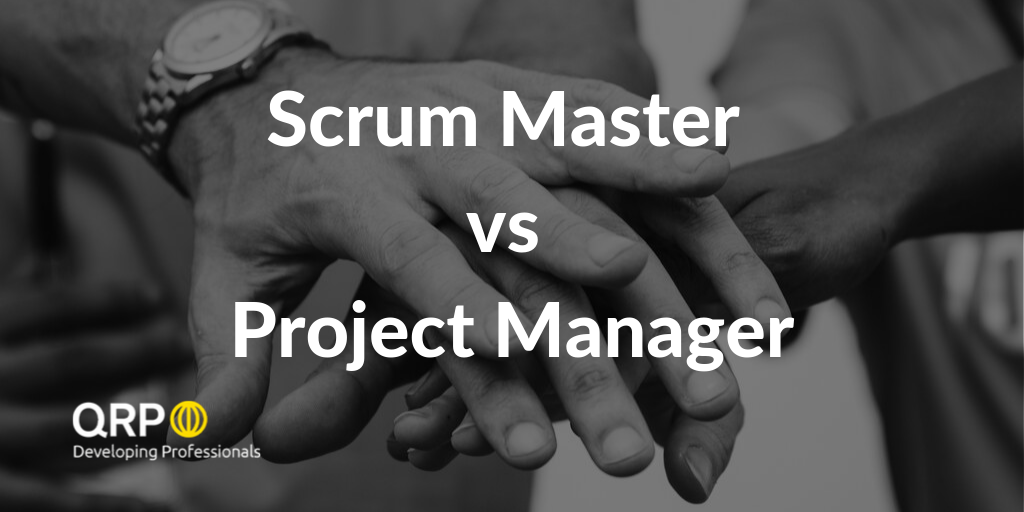
For those who are approaching an Agile environment for the first time, the role of “Scrum Master” and the role of “Project Manager” could appear very similar. It’s not true. The Scrum Master and the Project Manager are two different professional figures, in this post, we will analyze both to catch all the peculiarities of these professionals.
The Project Manager is, first of all, a manager, this figure owns the responsibility of reaching all the project goals by coordinating business and technical delivery aspects of the projects throughout its duration and provides management direction and coordination.
The Scrum Master is a servant-leader for the Scrum Team. This Scrum professional helps everyone to understand Scrum theory, practices, rules, and values inside and outside the Scrum Team. A Scrum Master is more like a coach than a manager, in fact, any Scrum Master:
- doesn’t manage the team but is responsible for promoting and supporting Scrum and the Agile principles.
- supports the Product Owner
- is responsible for Scrum processes and their correct implementation with and within the Scrum Team. The Scrum Master is devoted to maximize the value created by the Scrum Team.
In few words, the Project Manager manages all the planning for the project execution whereas, the Scrum Master supports the Scrum Team by working side by side with its members and he/she verifies that the Agile principles are implemented correctly.
The Scrum Master, contrarily to the Project Manager, doesn’t assign tasks to the team members, he/ she is a process facilitator by leading the team to achieve an efficient self-management and self-organization. The self-organization is a core principle of the Scrum Team: the Scrum Team is not managed by a hierarchical structure but every member knows what to do and how to do it, no external direction is involved.
In an Agile project, the responsibilities that a Project Manager has in a traditional project, are shared among several figures:
- Product Owner
- Scrum Master
- Development Team
The activities of a Scrum Master change daily depending on the exigencies of the team: s/he has the responsibility of the correct functioning of the team by protecting it from external dangers. The Scrum Master is a fundamental role because he/she supports the team towards project success.
The main focus of a Project Manager is on the overall project meanwhile, the Scrum Master is focussed on the team and the team members. The Project Manager aim is to ensure the success of the project whereas, the scope of the Scrum Master is the success of the team.
The Project Manager in an Agile environment: The PM and the Scrum Team
When an organization switches from traditional to Agile methods, the Project Manager might feel uncomfortable with the Agile processes and this is due to the differences in the functioning between an Agile self-organized and a traditional, external managed team.
In an Agile context, the Project Manager has to delegate the detailed planning to the scrum teams. The relationship between the Project Manager and the Development Team is more of an informal kind: the project manager won’t be focussed on having a regular check on what the team does, he will verify that the teams work in a right context instead. The Project Manager has to collaborate with the Development Teams helping them to handle problems and giving guidance. Anyway, the responsibility of a Project Manager is to ensure that the Development Team understands the objectives agreed at the beginning of any timebox and the importance of delivering on-time to reach them.
Finally, the Project Manager and the Scrum Master can coexist but they are two distinguished professionals. Thinking that the Project manager should become a Scrum Master is a mistake. Several Project Managers are unable to fit perfectly the Scrum Master role because they enact the “command and control” style inside the Scrum Team. The successful Scrum Master is a professional passionate for Agile who can share their knowledge through the servant leadership disregarding the technical or managerial background one could have.


ITIL 4 Certification Scheme
The New ITIL 4 Certification Scheme is composed by two streams, ITIL Managing Professional (ITIL MP) and ITIL Strategic Leader (ITIL SL) and it is connected to the previous ITIL version, ITIL v3, by a transition module called ITIL Managing Professional (MP) Transition (see image below: ITIL MP Transition is on the left and coloured in brown).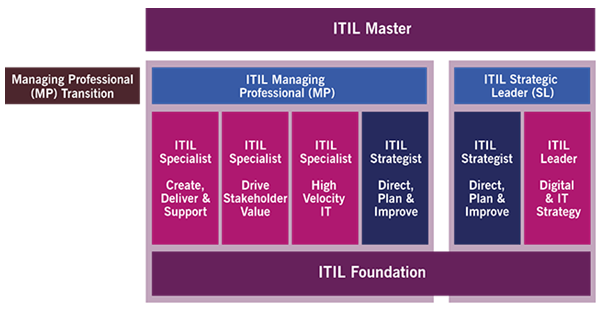
ITIL 4 Managing Professional
ITIL 4 Managing Professional (ITIL MP) stream provides practical and technical knowledge about how to run successful IT-enabled services, teams, and workflows. A Managing Professional transition module has been designed to allow ITIL v3 Experts or professionals who have a minimum of 17 v3 credits to easily transition across to ITIL 4 and gain the designation of ITIL 4 Managing Professional via one course and one exam. The transition module enables candidates to recognize their previous achievements while still gaining the up-to-date skills and knowledge needed to navigate the digital service economy. The module will provide information on the key elements of the following modules from ITIL 4 Managing Professional:- ITIL 4 Specialist Create, Deliver and Support.
- ITIL 4 Specialist Drive Stakeholder Value.
- ITIL 4 Specialist High Velocity IT.
- ITIL 4 Strategist Direct Plan and Improve.

The PRINCE2 Foundation qualification is a professional qualification in the field of Project Management. This qualification provides you with an understanding of the PRINCE2 2017 project management method. There are no mandatory prerequisites. Work experience in project management is recommended.
Examination Target
- Project Managers and aspiring Project Managers
- Other key staff involved in the design, development and delivery of projects, including: Project Board members (e.g. Senior Responsible Owners), Team Managers (e.g. Product Delivery Managers), Project Assurance (e.g. Business Change Analysts), Project Support (e.g. Project and Programme Office personnel), and operational line managers/staff.
Exam Format
- Language: Dutch, English, French
- Duration: 60 minutes 25% extra time if you take the exam in a language that is not your native language
- Materials: No materials
- Closed book exam: books or notes are not permitted
- Questions: 60
- All 60 questions are Objective Test Questions (OTQs)
- Pass Mark: 33 marks or above
- Level of Thinking: Bloom’s levels 1 & 2
- There are 7 questions at Bloom’s Level 1 = approx. 12%
- There are 53 questions at Bloom’s Level 2 = approx. 78%
- Exam Format: Online or Paper
- Certificate Format: Online
- The online certificate is usually included in the exam fee, you could ask for a paper certificate to the Exam institute after your exam.
PRINCE2 Foundation Exam Sample Questions
The questions are all ‘multiple-choice’. Standard, List, Missing word, Negative
Example ‘standard’ OTQ:
What is the purpose of the quality theme?
a) Q b) P c) R d) S
Example ‘list’ OTQ:
Which statements about product-based planning are CORRECT?
1. It does Q 2. It does P 3. It does R 4. It does S
a) 1 and 2 b) 2 and 3 c) 3 and 4 d) 1 and 4
NOTE: Two of the list items are correct. List style questions are never negative.
Example ‘missing word’ OTQ
Identify the missing word(s) in the following sentence.
During the ‘controlling a stage’ process, the team manager should update the [ ? ] to reflect the timing of the work packages that have been authorized.
a) Role Q b) Role P c) Role R d) Role S
Example ‘negative’ standard OTQ:
Which role should NOT be shared with the role of the project manager?
a) Q b) P c) R d) S
NOTE: Negative questions are only used, as an exception, where part of the learning outcome is to know that something is not done or should not occur.
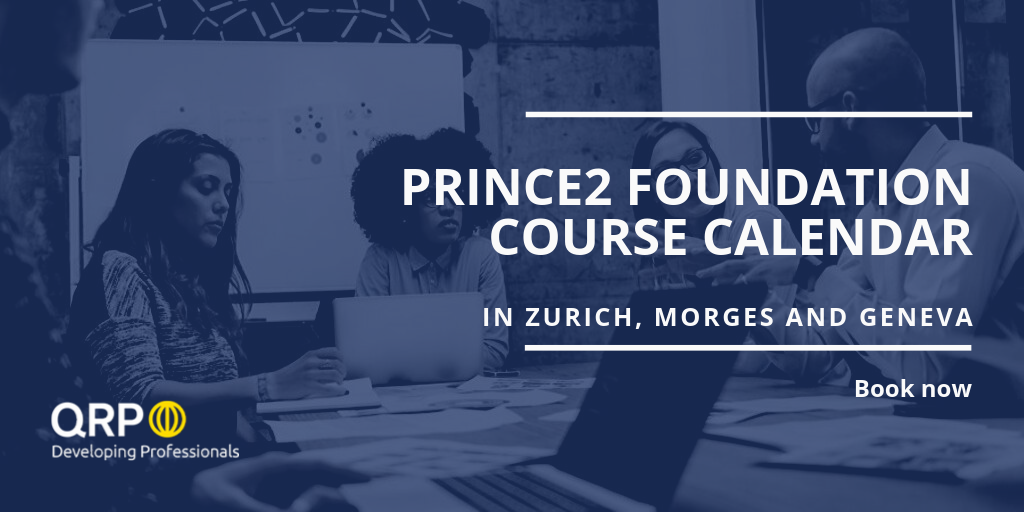
PRINCE2 Foundation Objectives
This exam has been developed to assess whether the candidate can demonstrate sufficient recall and understanding of the PRINCE2 project management method. You need to pass the PRINCE2 Foundation examination to access the PRINCE2 Practitioner Examination.
As a candidate you need to demonstrate the achievement of these learning outcomes:
- Understand key concepts relating to projects and PRINCE2.
- Understand how the PRINCE2 principles underpin the PRINCE2 method.
- Understand the PRINCE2 themes and how they are applied throughout the project.
- Understand the PRINCE2 processes and how they are carried out throughout the project.
The PRINCE2 Foundation Certificate
The validity of the PRINCE2 Foundation certificate is a lifetime; This certificate will never expire.
QRP International is a PRINCE2 Accredited Training Organisation (ATO) by Peoplecert on behalf of Axelos, is authorised to deliver PRINCE2 Foundation courses and can prepare you for the examination leading to the PRINCE2 Foundation Certificate in Project Management.

 The image above represents the whole ITIL v4 certification path: there are two main certification streams represented in light blue, ITIL Managing Professionals (MP) and ITIL Strategic Leader (SL).
To obtain the designation ITIL Managing Professional or ITIL Strategic Leader, the professional must complete the Foundation Module for both path plus all the four modules for ITIL MP or all the two modules for ITIL SL.
The Module ITIL Strategist - Direct, Plan & Improve (in blue) is common to both streams.
How many credits do you have in the ITIL v3 certification scheme? Find several tips depending on your achieved credits below:
The image above represents the whole ITIL v4 certification path: there are two main certification streams represented in light blue, ITIL Managing Professionals (MP) and ITIL Strategic Leader (SL).
To obtain the designation ITIL Managing Professional or ITIL Strategic Leader, the professional must complete the Foundation Module for both path plus all the four modules for ITIL MP or all the two modules for ITIL SL.
The Module ITIL Strategist - Direct, Plan & Improve (in blue) is common to both streams.
How many credits do you have in the ITIL v3 certification scheme? Find several tips depending on your achieved credits below:
ITIL v3 Foundation (2 credits)
if you are already ITIL v3 Foundation certified, our advice is to follow the new ITIL 4 foundation training in order to achieve the ITIL 4 Foundation Certificate. ITIL 4 Foundation is completely renewed with lots of new content, that’s why a new exam to show your knowledge about the ITIL 4 Foundation guidance is required. After the achievement of the Foundation module, you will have the chance to follow the stream that fits better your needs upon the new ITIL Certification Scheme.ITIL v3 Foundation + ITIL Intermediate and / or Practitioner (up to 6 credits)
If you have reached the Foundation level and you have further 3-4 credits you have two options:
- achieving the ITIL 4 Foundation plus another module belonging to the stream of your choice in order to have the chance to become ITIL Specialist, Strategist or Leader. If you are not interested in pursuing the ITIL Managing Professional designation, there are still options to be offered among the ITIL Specialist modules and/or ITIL Strategist module. In the last case, the route we recommend you is to take the most relevant module in your area of practice/interest.
- Or you can choose to gain up to 17 credits in ITIL v3 to switch to the ITIL 4 scheme through the ITIL Managing Professional Transition Module. You have time to gain credits until June 2020, after this date, Axelos will dismiss all the ITIL v3 modules and taking further ITIL v3 exams won’t be possible.
Our advice: better to undertake directly the ITIL 4 Certification path by enrolling for the ITIL 4 Foundation exam.
ITIL v3 Intermediate/Practitioner (more than 6 credits)
if you already gained more than 6 credits we advise you to carry on obtaining credits within the ITIL v3 scheme to prepare the transition to ITIL 4 through the module ITIL Managing Professional Transition.ITIL v3 Expert
If you are an ITIL Expert you can apply for the module ITIL Managing Professional when it turns available. Once obtained the certification ITIL Managing Professional, if interested in pursuing the ITIL Strategic Leader qualification, you will just achieve the ITIL Leader Digital & Strategy module. If you complete both streams (ITIL Managing Professionals and ITIL Strategic Leader) you can opt to carry on your ITIL path to achieve the ITIL Master level. Do you have further doubts or do you want to know more?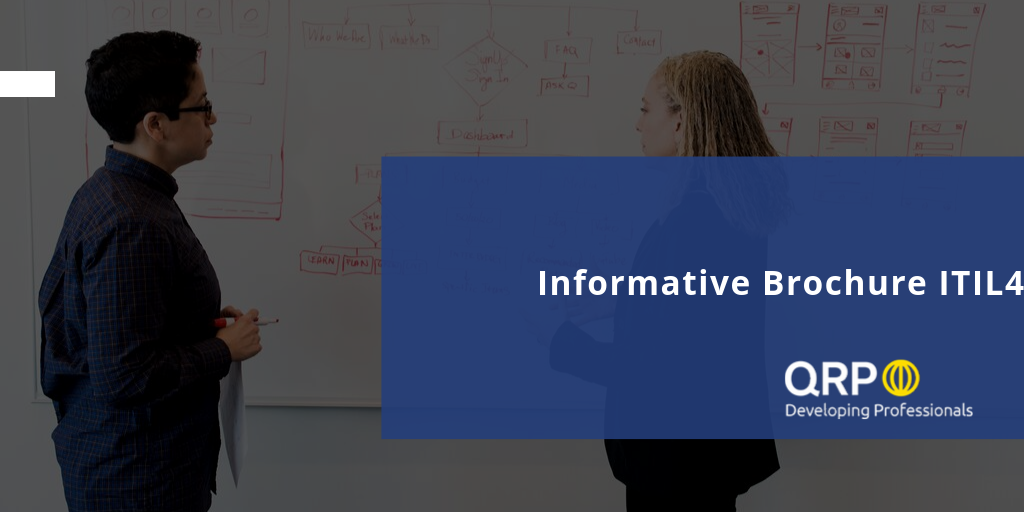 Download the brochure in German too!
To find more information about the motivation behind the update, visit this informative page!
Sources: Axelos, ITIL® Credit System; ITIL 4: all the answers to the most asked questions
Download the brochure in German too!
To find more information about the motivation behind the update, visit this informative page!
Sources: Axelos, ITIL® Credit System; ITIL 4: all the answers to the most asked questions






